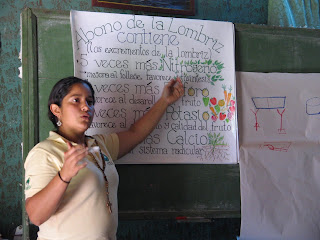
On 1/29, Karla gave a workshop in Santa Rosa on worm composting. Dan and Hannah attended to support her and to learn about the process. Karla discussed the characteristics and basic biology of the worms, and referred to a sample that she brought, of both the dried compost and the live worms in their moist, poopy environment. She talked about how to care for one’s worms, and noted dangers from common barnyard predators, such as chickens and ants, as well as easy preventions. Some of the people in the group had experience with worm composting, and offered other advice about how to handle and prevent predator attacks.
The worm farmer must check her worms daily; if not, she could return the following day to find them all dead! For example, one can give worms banana peels to eat, but don’t give them too much, or ants will sense the sweet sugar in the rinds, and invade the worm-box, eating the peels and worms alike. Additionally, one must give water and fresh “food” to the worms regularly, so they stay comfortable and happy. Interestingly, if one gives them too much food, they become lethargic and their compost productivity (ie eating and digesting) goes way down. One must be diligent to reap the full benefits of a worm box.
Karla ensured that everyone would have their worm boxes ready for her to deliver a “starter batch” of worms the following week, with elevated, covered wooden boxes in the shade to put the worms in. The people of Pasmata, where FCP did the pilot Huertos program a couple of years ago, donated the worms for this community to get started.
The workshop was well organized and informative, and people were eager to learn about the benefits of worm composting for their Huertos, and excited that someday they could sell the compost, bringing income to their households. There was even discussion of coming together to form a worm cooperative, once the worms reproduce and fill everyone’s boxes. A healthy worm box can produce over 200 pounds of compost every month, if managed correctly, which can be sold at a very good price, as it is rich in nutrients that help with foliage, fruit and root development.
No comments:
Post a Comment